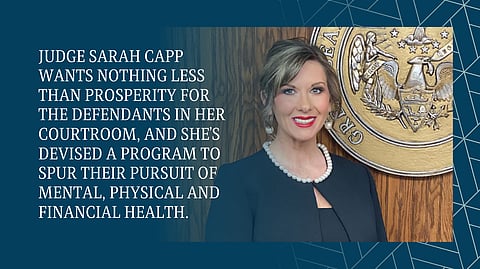
- Home
- Topic Areas
- Newsletter
- Podcast
- 100 Families Initiative
- About
- Connect
- Restore Hope

Judge Sarah Capp's program in the 7th Judicial District, serving Franklin and Johnson counties, helps defendants avoid misdemeanor criminal records and climb out of debt from court costs – if they undertake educational programs or counseling, or serve their community.
“If we want to rework our court system and effectuate positive outcomes, we have to invest in positive stories,” says Capp, a former public defender who also served two terms in the state legislature.
Since taking the bench in January 2021, Capp has offered defendants three ways to earn credit against their fines and court costs, when appropriate under the law.
They can enroll in adult education programs such as workforce training and GED. They can participate in counseling for mental health or substance abuse, or they can engage in community service.
Capp will postpone judgment of cases, giving the defendants time to demonstrate completion. Upon graduation, she can relieve them of owing fines and costs and, in some cases, dismiss the case so it isn’t part of their criminal record. (Statutory limitations for DWI and domestic battery prevent this.)
“In district court, we have more direct contact with litigants than any other court system. Most people have probably had some type of a traffic ticket – so they have been in district court. By giving individuals this first impression that positive outcomes can occur, and that everyone makes a mistake and you’re given the chance to right that, I think that’s making a difference."
Capp modeled her program after District Judge Chuck Baker’s alternative sentencing program in Crawford County.
During her two years on the bench, more than 600 defendants have participated in the court referral program, and her statistics show that between 50 and 60 percent are graduating.
The two counties in which she conducts court have saved an estimated $60,000 and $74,500 in jail costs from the program.
“The inability (of defendants) to pay is a problem that the court system is going to have to address, and providing alternative methods of sentencing is one way that I think that we can handle that,” she says.
Capp does receive appreciation from defendants. “I have had people thank me for giving them the chance. I’ve heard from the probation officers that people are moved to tears behind closed doors, that they’ve been given the chance to do this.”
For each court session, Capp has a team present in the courtroom, made up of representatives from adult education and counseling agencies, along with a probation officer.
“For this program, we started probation for the first time in our district court. We had to convince the local government that it needed to be funded and what it would provide. We had to make certain that those types of positions were available.”
The team assesses the defendants, to make sure each is getting a good fit in their chosen program, then enters into formal agreements and monitors progress throughout.
“Following the recommendations of whoever is assessing them is very important. For instance, when someone tests at a fourth or fifth grade reading level, the likelihood that they’re going to be able to get a GED is slim to none in the timeframe that we’re going to be dealing with them,” Capp says. “There are a lot of resources out there for individual needs, whether that be job readiness or some type of anger management program. We had someone who was able to obtain certification from a welding program, so they were able to wipe out their fines and costs and learn a trade at the same time. So that’s great.”
The time commitment is substantial yet fully worth the investment, Capp says.
“When you look at the big picture, I don’t think that there’s anything to lose here and there’s a whole lot to gain.”
Smart Justice is a magazine, podcast, and continuing news coverage from the nonprofit Restore Hope and covers the pursuit of better outcomes on justice system-related issues, such as child welfare, incarceration, and juvenile justice. Our coverage is solutions-oriented, focusing on the innovative ways in which communities are solving issues and the lessons that have been learned as a result of successes and challenges.
The podcast is available on all major podcasting platforms.
Subscribe to the Smart Justice newsletter.
